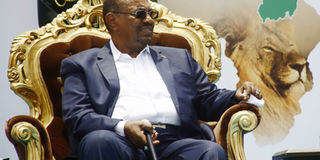African leaders ditched by army amid popular revolts

Sudan's President Omar al-Bashir takes part in a ceremony in hias honour upon his return from Ethiopa in the Sudanese capital Khartoum on July 30, 2016. AFP PHOTO
What you need to know:
- In January 2011 mass protests broke out against Egypt's leader for nearly three decades, Hosni Mubarak, a former air force commander.
After Sudan's army removed Omar al-Bashir from power on Thursday, here are some other cases where African leaders have fallen after the military sided with popular protests.
Algeria: Abdelaziz Bouteflika
In power for two decades, Algeria's ailing 82-year-old Abdelaziz Bouteflika resigned on April 2 after the army dropped its vital support and backed weeks of mass protests demanding he step down.
Protests started in February against his candidacy for a fifth mandate in presidential elections.
As public anger grew, Bouteflika announced he would not stand in the polls and delayed elections without setting a new date.
The protests continued and in a major turning point, army chief Ahmed Gaid Salah -- considered loyal to Bouteflika -- on March 26 demanded the president step down or be declared medically unfit to rule.
On April 2 Salah went further and demanded immediate impeachment proceedings against him.
Hours later Bouteflika submitted his resignation with immediate effect.
Zimbabwe: Robert Mugabe
Abandoned by his party and the army, the oldest serving leader in the world at 93, Robert Mugabe submitted his resignation to parliament on November 21, 2017.
There had been a series of massive street protests the previous year demanding Mugabe step down, with security forces routinely cracking down on such dissent.
But the army itself took a stand in November 2017 after Mugabe sacked his vice president, Emmerson Mnangagwa, who had close ties with the military.
It warned it could intervene to stop a purge of Mugabe's rivals, and put the veteran leader under effective house arrest.
Tens of thousands of people took to the streets of the main cities Harare and Bulawayo in demonstrations -- this time backed by the army -- calling for him to quit.
Days later the ruling ZANU-PF party sacked him as leader and -- after holding on for several more days -- Mugabe eventually bowed to the pressure and quit.
Mnangagwa took over.
Egypt: Hosni Mubarak
In January 2011 mass protests broke out against Egypt's leader for nearly three decades, Hosni Mubarak, a former air force commander.
In 18 days of mass protests against his rule, some 850 people were killed.
There were reports of soldiers shedding their uniforms to join the protests and on February 10 the military said it would respond to the "legitimate" demands of the people and "protect the nation".
Finally, on February 11, Mubarak resigned and handed power to the military.
It suspended the constitution and appointed a caretaker cabinet until elections in June 2012 made Islamist Mohamed Morsi Egypt's first civilian democratically elected president.
After mass protests against Morsi's divisive rule, the military led by Abdel Fattah al-Sisi overthrew him in July 2013. General Sisi took power.
Mali: Moussa Traore
Having seized power in a coup in 1968, Mali's General Moussa Traore was toppled on March 26, 1991 when soldiers turned against him after he had sent them to crack down on weeks of protests against his dictatorship.
Scores were killed in violent repression of the demonstrations, and the armed forces eventually refused to use their weapons against the Malian people.
The coup was led by paratrooper Amadou Toumani Toure, who handed power to a civilian government before he himself was elected president.




